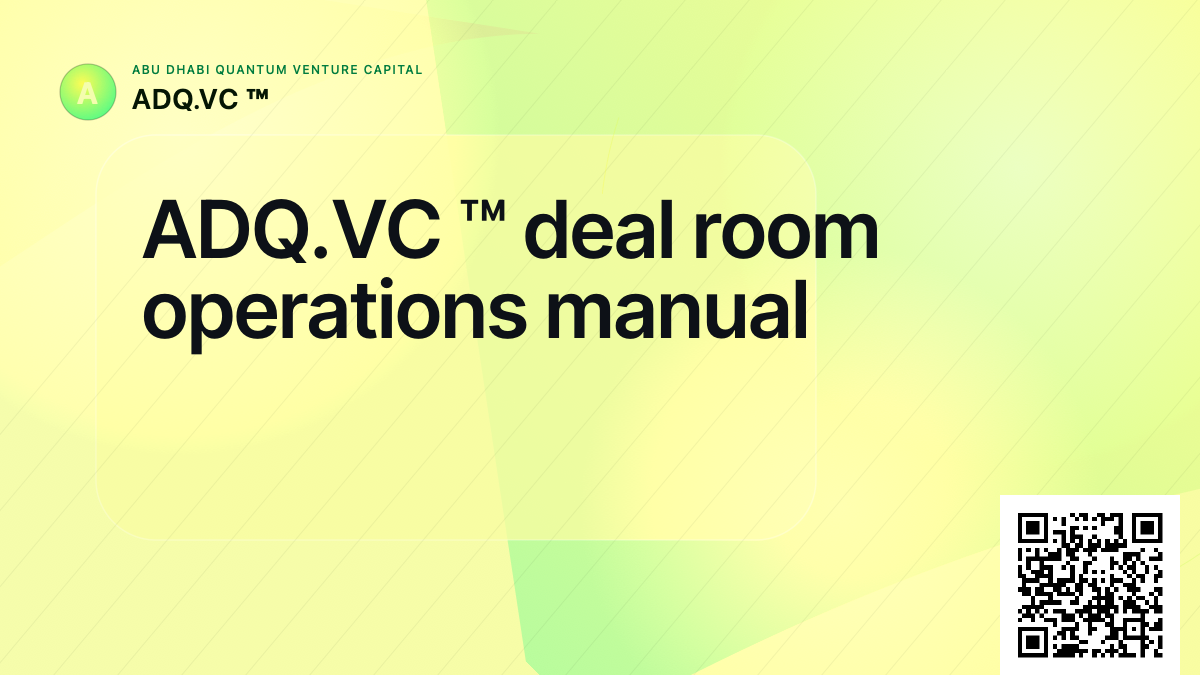Deal rooms are where premium domains prove their worth. ADQ.VC ™ is more than a static landing page; it is a control panel for every quant VC transaction connected to Abu Dhabi. This manual outlines the workflows, security posture, and reporting loops that keep deal rooms disciplined and auditable.
Access management
Every deal room starts with identity. Prospects request access via ADQ.VC ™ forms that feed into an approval queue managed by operations and legal. Applications capture corporate entity data, beneficial ownership, data handling plans, and Abu Dhabi presence. Approved users receive time-boxed credentials tied to hardware security keys. Access logs sync with SIEM tools, so any anomalous login triggers an alert.
The domain also stores role matrices defining who can upload diligence materials, who can annotate, and who can export. These matrices align with Abu Dhabi regulations and LP covenants, preventing overexposure of sensitive documents.
Content handling
Deal rooms host financial models, quant research, code snippets, and regulatory filings. ADQ.VC ™ enforces content guidelines: no executable files without sandbox review, all spreadsheets require checksum verification, and documents must include version numbers. Metadata tags identify whether a file is cleared for external counsel, portfolio operators, or internal-only consumption.
Version control lives within the domain. Every upload generates a permalink with author, timestamp, and change summary. Teams reference those permalinks in committee decks and Signal Reports, ensuring audits always trace back to a single record.
Workflow automation
Quant VC deals involve multi-stage workflows—initial review, technical diligence, compliance sign-off, and final structuring. ADQ.VC ™ embeds checklists for each stage, complete with dependencies and due dates. When a stage closes, the system notifies the next owner and logs the event for reporting. If a task stalls, escalation alerts route to operations leaders with context from previous notes.
Workflow templates also capture Abu Dhabi-specific requirements, such as ADGM approvals or sovereign co-investor notifications. Listing them directly on ADQ.VC ™ prevents teams from skipping steps when deal volume spikes.
Security posture
Security measures are visible but unobtrusive. All deal room subpaths inherit ADQ.VC ™’s TLS configuration, content security policies, and bot mitigation. Static assets load from trusted CDNs with subresource integrity hashes. Activity dashboards track data egress, and anomaly detection flags mass downloads or unusual API calls.
Incident response runbooks sit beside the deal room docs. They cover credential revocation, forensic logging, and communications with founders, LPs, and regulators. Posting the runbooks on ADQ.VC ™ demonstrates preparedness without revealing sensitive tooling.
Founder experience
Deal rooms succeed when founders feel supported. ADQ.VC ™ offers onboarding videos explaining how to upload materials, what reviewers look for, and how to request clarification. Founders see real-time indicators showing which stakeholders have viewed their documents, reducing anxiety about silent diligence cycles. Post-close, the same space morphs into a transition hub containing integration checklists and Abu Dhabi relocation resources.
Feedback widgets embedded in the deal room capture founder sentiment and surface usability issues. Operations teams review the feedback weekly and document fixes so the experience keeps improving.
Reporting and retrospectives
Deal rooms feed into reporting cycles. ADQ.VC ™ automatically summarizes participation metrics—documents viewed, diligence tasks completed, and questions answered—and attaches the summary to the corresponding Signal Report. After each deal closes, the team runs a retrospective capturing what went well, where friction appeared, and what automations should be built next. Those retrospectives are archived under a private /ops/retro section so future deals benefit from accumulated lessons.
KPIs
Operations leaders track KPIs such as average diligence duration, number of escalations resolved within SLA, and percentage of actions completed on time. KPIs appear on an internal dashboard within ADQ.VC ™, giving executives and LP auditors instant visibility into deal room health. When KPIs breach thresholds, owners log remediation steps and publish summaries inside the Signal Reports feed.
Data residency considerations
Because Abu Dhabi prioritizes data sovereignty, ADQ.VC ™ specifies where deal room data resides. Documentation lists primary and secondary regions, outlines encryption-at-rest controls, and explains how backups respect UAE regulations. When cross-border team members need access, the system records legal approvals and expiry dates. Highlighting data residency inside the domain reassures founders handling sensitive IP and LPs overseeing compliance.
Financial controls
Deal rooms intersect with treasury when fees, deposits, or milestone payments flow through the process. ADQ.VC ™ outlines which bank accounts may be referenced, how escrow receipts are shared, and who approves any fund transfers triggered by diligence outcomes. Posting these rules keeps auditors satisfied and prevents ad-hoc promises during negotiations. By codifying these operations on ADQ.VC ™, quant VC teams keep every transaction aligned with Abu Dhabi governance and the premium brand they fought to secure.
